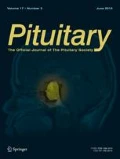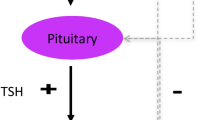Abstract
Recent studies have demonstrated that hypopituitarism, and in particular growth hormone deficiency (GHD), is common among survivors of traumatic brain injury (TBI) tested several months or years following head trauma. In addition, it has been shown that post-traumatic neuroendocrine abnormalities occur early and with high frequency. These findings may have significant implications for the recovery and rehabilitation of patients with TBI. The subjects at risk are those who have suffered moderate-to severe head trauma although mild intensity trauma may precede hypopituitarism also. Particular attention should be paid to this problem in children and adolescents. GH deficiency is very common in TBI, particularly isolated GHD. For the assessment of the GH-IGF axis in TBI patients, plasma IGF-I concentrations plus GH response to a provocative test is mandatory. Growth retardation secondary to GHD is a predominant feature of GHD after TBI in children. Clinical features of adult GHD are variable and in most obesity is present. Neuropsychological examinations of patients with TBI show that a significant portion of variables like attention, concentration, learning, memory, conceptual thinking, problem solving and language are impaired in patients with TBI. In the few case reports described, hormone replacement therapy in hormone deficient head-injured patients resulted in major neurobehavioral improvements. Improvements in mental-well being and cognitive function with GH replacement therapy in GHD adults have been reported. The effect of GH replacement in posttraumatic GHD needs to be examined in randomized controlled studies.
Similar content being viewed by others
References
Dattani M, Preece M. Growth hormone deficiency and related disorders: Insights into causation and treatment. The Lancet 2004;363:1977.
Abs R, Mattsson A, Bengtsson BA, Rasmussen U, Goth M, Koltowska-Haggstrom M, Monson J, Verhelst J, Wilton P. On behalf of the KIMS study group isolated growth hormone (GH) deficiency in adult patients: Baseline clinical characteristics and responses to GH replacement in comparison with hypopituitary patients. Growth Hormone and IGF Research in press 2005.
Sassolas G, Borson Chazot F, Jaquet P, Bachelot I, Chanson P, Rudelli C, Tauber J, Allannic H, Bringer J, Roudaut N, Rohmer V, Roger P, Latapie J, Reville P, Leutenegger M. GH deficiency in adults: An epidemilogical approach. European Journal of Endocrinology 1999;141:595.
Growth Hormone Research Society: Consensus guidelines for the diagnosis and treatment of adults with growth hormone deficiency: Summary statement of the growth hormone research society workshop on adult growth hormone deficiency. J Clin Endocrinol Metab 1998;83:379.
Toogood A, Beardwell C, Shalet S. The severity of growth hormone deficiency in adults with pituitary disease is related to the degree of hypopituitarism. Clinical Endocrinology 1994;41:511.
Hartman M, Crowe B, Biller B, Ho K, Clemmons D, Chipman J. On behalf of the HypoCCS Advisory Board and the US HypoCCS Study Group. Which patients do not require a GH stimulation test for the diagnosis of GH deficiency? J Clin Endocrino Metab 2002;87:477.
Biller B, Samuels M, Zagar A, Cook D, Srafah B, Bonert V, Stavrou S, Kleinberg D, Chipman J, Hartman M. Sensitivity and specificity of six tests for the diagnosis of adult GH deficiency. J Clin Endocrinol Metab 2002;87:2067.
Hoffman D, O'Sullivan R, Baxter R, Ho K. Diagnosis of growth hormone deficiency in adults. The Lancet 1994;343:1064.
Aimaretti G, Corneli G, Razzore P, Baffoni C, Arvat E, Camanni F, Ghigo E. Comparison bewteen insulin-induced hypoglycaemia and growth hormone (GH) –releasing hormone+ariginine as provocative tests for the diagnosis of GH deficiency in adults. J Clin Endocrinol Metab 1998;83:1615.
Ghigo E, Aimaretti G, Arvat E, Camanni F. Growth hormone-releasing hormone combined with arginine or growth hormone secretagogues for the diagnosis of growth hormone deficiency in adults. Endocrine 2001;15:29.
Popovic V, Leal-Cerro A, Micic D, Koppeschaar H, Torres E, Paramo C, Obradovic S, Dieguez C, Casanueva FF. GH-releasing hormone and GH-releasing peptide-6 for diagnostic testing in GH-deficient adults. The Lancet 2000;356:1137.
Murray R, Howell S, Lisset C, Shalet S. Pretreatment IGF-I level is the major determinant of GH dosage in adult GH deficiency. Clin Endocrinol 2000;52:537.
Kelly D, Gonzalo I, Cohan P, Berman N, Swerdloff R, Wang C. Hypopituitarism following traumatic brain injury and subarachnoid hemorrhage: A preliminary report. Journal of Neurosurgery 2000;93:743.
Benvenga S, Campenni A, Ruggeri R, Trimachi F. Hypopituitarism secondary to head trauma. J Clin Endocrinol Metab 2000;85:1353.
Lieberman S, Oberoi A, Gilkinson C, Masel B, Urban R. Prevalence of neuroendocrine dysfunction in patients recovering from traumatic brain injury. J Clin Endocrinol Metab 2001;86:2752.
Aimaretti G, Ambrosio M, Di Somma C, Fusco A, Cannavo S, Gasperi M, Scaroni C, De Marinis L, Benvenga S, Degli Umberti EC, Lombardi G, Mantero F, martino E, Giordano G, Ghigo E. Traumatic brain injury and subarachnoid haemorrhage are conditions at high risk for hypopituitarism: Screening study at 3 months after brain injury. Clin Endocrinol 2004;61:320.
Agha A, Rogers B, Sherlock M, O'Kelly P, Tormey W, Phillips J, Thompson C. Anterior pituitary dysfunction in survivors of traumatic brain injury. J Clin Endocrinol Metab 2004;89:4929.
Popovic V, Pekic S, Pavlovic D, Maric N, Jasovic-Gasic M, Djurovic B, Stojanoska-Medic M, Zivkovic V, Stojanovic M, Doknic M, Milic N, Djurovic M, Dieguez C, Casanueva FF. Hypopituitarism as a consequence of traumatic brain injury (TBI) and its possible relation with cognitive disabilities and mental distress. J Endocrinol Invest 2004;27:1048.
Aimaretti G, Ambrosio M, Di Somma C, Gasperi M, Cannavo S, Scaroni C, Fusco A, Del Monte P, Menis E, Faustini-Fustini M, Grimaldi F, Logoluso F, Razzore P, Rovere S, Benvenga S, degli Uberti E, De Marinis L, Lombardi G, Mantero F, Martino E, Giordano G, Ghigo E. Prospective study about brain injury-induced hypopituitarism: Residual pituitary function may improve or more rarely worsen over 12 months follow-up. J Clin Endocrinol Metab in press 2005.
Gnehm H, Bernasconi S, Zachmann M. Posttraumatic anterior pituitary insufficiency in children Helv. Paediatr Acta 1979;34:529.
Ferriero D. Neonatal Brain Injury. N Engl J Med 2004;351:1985.
Carroll P, Christ E, Bengtsson B, Carlsson L, Christiansen J, Clemmons D, Hintz R, Ho K, Laron Z, Sizonenko P, Sonksen P, Tanaka T, Thorner M. GH deficiency in adulthood and the effects of GH replacement. A review. J Clin Endocrinol Metab 1998;83:382.
Drake W, Howell S, Monson J, Shalet S. Optimizing GH therapy in adults and children. Endocrine Rev 2001;22:425.
Burman P, Broman J, Hetta J, Wiklund I, Erfurth E, Hagg E, Karlsson EF. Quality of life in adults with growth hormone (GH) deficiency: Response to treatment with recombinant human GH in placebo-controlled 21 month trial. J Clin Endocrinol Metab 1995;80:3585.
Deijen J, de Boer H, Blok G, van der Veen EA. Cognitive impairments and mood disturbances in growth hormone deficient men. Psychoneuroendocrinology 1996;21:313.
Bulow B, Hagmar L, Orbaek P, Osteberg K, Erfurth E. High incidence of mental disorders, reduced mental well-being and cognitive function in hypopituitary women with GH deficicency treated for pituitary disease. Clin Endocrinol (Oxf) 2002;56:183.
Bülow B, Hagmar L, Mikoczy Z, Nordström CH, Erfurth EM. Increased cerebrovascular mortality in patients with hypopituitarism. Clin Endocrinol 1997;46:75.
Svensson J, Bengtsson B, Rosen T, Oden A, Johannsson G. Malignant disease and cardiovascular morbidity in hypopituitary adults with or without growth hormone replacement therapy. J Clin Endocrinol Metab 2004;89:3306.
Vogenthaler D. An overview of head injury:its consequences and rehabilitation. Brain Injury 1987;1:113.
Springer J, Chollet A. A traumatic car crash. The Lancet 2001;357:1848.
Schneider H, Pagotto U, Stalla G. Central effects of the somatotropic axis. European Journal of Endocrinology 2003;149:377.
Johansson J, Larson G, Andersson M, Elmgren A, Hynsjo L, Lindahl A, Lundberg P, Isaksson O, Lindstedt S, Bengtsson B. Treatment of growth hormone–deficient adults with recombinant human growth hormone increases concentration of growth hormone in cerebrospinal fluid and affects neurotransmitters. Neuroendocrinology 1995;61:57.
Lai Z, Emtner M, Roos P, Nyberg F. Characterization of putative growth hormone receptors in human choroid plexus. Brain Res 1991;546:222.
Burman P, Hetta J, Wide L, Mansson J, Ekman R, Karlson F. Growth hormone treatment affects brain neurotransmitters and thyroxine. Clin Endocrinol (Oxf) 1996;44:319.
Deijen J, de Boer H, van der Veen E. Cognitive changes during growth hormone replacement in adult men. Psychoneuroendocrinology 1998;23:45.
Oertel H, Schneider H, Stalla G, Holsboer F, Zihl J. The effect of growth hormone substitution on cognitive performance in adult patients with hypopituitarism. Psychoneuroendocrinology 2004;29:839.
Golgeli A, Tanriverdi F, Suer C, Gokce C, Ozemi C, Bayram F, Kelestimur F. Utility of P300 auditory event related potential latency in detecting cognitive dysfunction in growth hormone (GH) deficient patients with Sheehan's syndrome and effects of GH replacement therapy. European Journal of Endocrinology 2004;150:153.
Author information
Authors and Affiliations
Rights and permissions
About this article
Cite this article
Popovic, V. GH Deficiency as The Most Common Pituitary Defect After TBI: Clinical Implications. Pituitary 8, 239–243 (2005). https://doi.org/10.1007/s11102-006-6047-z
Published:
Issue Date:
DOI: https://doi.org/10.1007/s11102-006-6047-z




